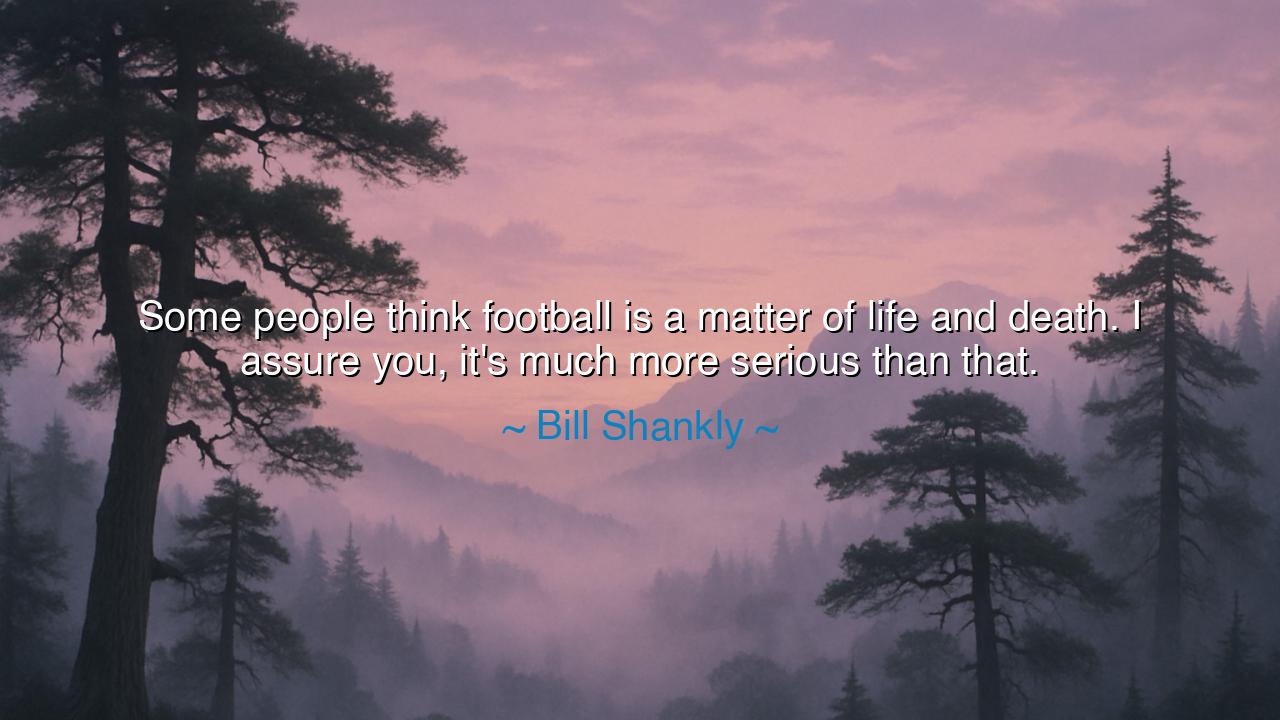
Some people think football is a matter of life and death. I
Some people think football is a matter of life and death. I assure you, it's much more serious than that.






“Some people think football is a matter of life and death. I assure you, it’s much more serious than that.” Thus spoke Bill Shankly, the legendary Scottish manager who forged Liverpool Football Club into a symbol of passion, unity, and resilience. Though his words sparkle with humor, they are not to be taken lightly — for within them lies the ancient truth of devotion, the power of a cause that gives meaning to the lives of ordinary men. When Shankly spoke these words, he was not simply speaking of a game; he was speaking of faith, of belonging, of the sacred fire that burns in the hearts of those who give their all for something greater than themselves.
To understand Shankly’s words, we must understand the world he came from — the rough coal towns of Scotland, where hardship was not an idea but a daily companion. In those days, football was not a pastime; it was a salvation. It gave the working man a reason to lift his eyes from the dust and dream again. For ninety minutes on a Saturday, every man, woman, and child could forget the weight of poverty and loss, and remember what it meant to feel alive. When Shankly said football was more serious than life and death, he meant that it was one of the few things that gave life its purpose — that in the rhythm of the game, the roar of the crowd, and the unity of thousands of hearts beating as one, men and women could touch eternity.
Shankly, who managed Liverpool from 1959 to 1974, did not see football merely as competition, but as a communion of souls. He built his teams not from stars, but from brothers — men who would fight for one another until the final whistle. “The socialism I believe in,” he once said, “is everybody working for each other, everyone having a share of the rewards.” To him, football was a mirror of life’s highest ideals: loyalty, courage, and selflessness. His players were his warriors, his people his kingdom. Under his guidance, Anfield became a cathedral, and football its holy liturgy — a place where passion became prayer.
Consider a moment from 1973, when Liverpool faced Red Star Belgrade in the European Cup. Though Liverpool lost, Shankly stood before the reporters afterward not in despair but with a burning conviction. He said, “This defeat will make us stronger.” True to his word, within two years Liverpool had become champions of Europe. This was the essence of Shankly’s creed: that the struggle itself is sacred, that victory is born from heartbreak, and that in both triumph and defeat there is nobility. He saw football as the great metaphor of existence — for life, like the game, demands both courage and grace, both teamwork and sacrifice.
Yet there is a deeper wisdom hidden within his jest. When Shankly declared football “more serious than life and death,” he was also revealing the strange paradox of human passion: that we often find meaning not in survival, but in striving. Life without passion is mere endurance; it is through the things we love — be they art, music, or sport — that we transcend mere existence and step into the realm of spirit. For Shankly, football was a way of affirming life against despair, of proving that the human heart, even in the humblest setting, could create beauty, unity, and hope.
Through his leadership, Shankly transformed footballers into legends and spectators into believers. He taught his men that to play was to serve, and to serve was to live honorably. In this way, he elevated football from a sport to a philosophy of life — one that taught resilience in defeat, humility in victory, and loyalty above all else. His humor was sharp, but his heart was vast. When he spoke of life and death, he spoke as one who understood both — for he had seen suffering, yet chose joy; he had faced darkness, yet chose light. His laughter, then, was not trivial — it was defiance against despair, the laughter of one who believes that meaning, however small, is worth everything.
So, my child, take from Shankly’s words not the jest, but the spirit behind it. Whatever your passion — your craft, your art, your calling — give yourself to it wholly. Let it become your discipline, your community, your joy. For when you dedicate yourself with love, you do more than live — you create life. Treat your purpose as something sacred, more precious than even survival itself, for it is through purpose that the soul finds peace. And when you labor with heart and devotion, when you stand shoulder to shoulder with others in pursuit of something good, you too will know what Shankly meant: that there are things in this world more profound than life or death — and they are the things that make life worth living.






AAdministratorAdministrator
Welcome, honored guests. Please leave a comment, we will respond soon